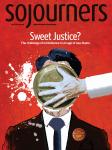IMAGINE AN UNLIKELY DUET. One singer is National Review senior editor Jonah Goldberg, a conservative political columnist who admits he indulged in “smash-mouth” rhetoric and once did a video mocking “social justice” as meaningless mush. The other is religion scholar Diana Butler Bass, a progressive liberal and author who champions social justice as central to a life of faith. Both published books this spring, and as they made separate media rounds, they sang the same song—an ode to gratitude.
Gratitude is having a big turn in the spotlight right now as influential writers, university researchers bolstered with millions in foundation grant funds, #blessed social media mavens, and more tout thankfulness as a boon to one’s spirit and health.
The claims are mighty for the benefits of thankfulness to others, to God, to Mother Nature. Bolster peace in the world—or at least your own small corner of it—via the virtue that could, by opening a path to moral consensus, save our society from fracturing in tribalism, fear, and frustration. Lower your blood pressure. Enhance your marriage. Find joy and avoid the sin of being an ingrate. Books and websites offer instructions for keeping a gratitude journal (feel measurably better about your life in a month!) or the recipe for a gratitude letter (allow 15 minutes, stay under 300 words, deliver in person if possible).
A recent study found that people who wrote “gratitude letters”—turning away from the “toxic emotions” stirred by negative thoughts to elucidate thankfulness—reported significantly better mental health four weeks and 12 weeks after their writing exercise ended, according to the online magazine of the University of California, Berkeley’s Greater Good Science Center. The center is the nexus for the Expanding the Science and Practice of Gratitude project, with more than $3 million in research grants and outreach programs.
GOLDBERG ISN’T writing gratitude letters. You don’t see the gratitude spin until nearly the end of his latest book. Suicide of the West delineates at length a conservative’s take on the grim side of populism, economic selfishness, and rampant resentment. As rival camps compete in Olympian duels of identity politics, claims of victimhood, and Trump-era ideological warfare, we are endangering what he considers to be the “miraculous” gifts of capitalism and democracy. The way out of the morass? Gratitude.
As angry as we all are, as confused, as split into “right,” “left,” and “mushy middle,” as we are, Goldberg says, “We are all sick of complaining. There is a decency in the American spirit that is responding to this, that says, ‘Can we take two seconds to talk about how (our situation) is not as bleak as it looks?’ and that says there are overlaps in our Venn diagrams where we can remember the things we all want to honor in our lives. In that overlap is where people who disagree can start.” He says, speaking of culture and politics, “I have changed my orientation and gratitude is [now] part of my path.”
Goldberg, who describes himself as culturally Jewish, offers a God-optional vision of gratitude that draws on two key holidays he observes: Passover, rooted in retelling a history of freedom in the present tense as if each of us has been released from bondage, and his favorite holiday, Thanksgiving, when “you give thanks to God, feed people, and have a couple of Bloody Marys.”
“Gratitude is the opposite of entitlement and resentment. Gratitude says, ‘You didn’t have to do this and I’m appreciative that you did.’ It can be a difficult thing to maintain. But it opens your heart and it opens your eyes and it allows you to talk about what consensus can look like.”
Bass, author of the new book Grateful, also presents gratitude as a life raft keeping body and soul afloat in fraught times. She was flabbergasted when she heard Goldberg say such things in a radio interview the very same April day she wrote about gratitude and moral consensus in a New York Times opinion page essay.
Flabbergasted and delighted but, on reflection, not surprised. She had landed on the same spot. The upheaval of the 2016 election so upset Bass that she initially sought to rewrite her book contract to pick a different topic. Now, says Bass, she’s glad she stuck to it.
Bass began her work with two questions. If a 2014 Pew Research Center survey found 78 percent of U.S. adults reported they feel grateful on a regular basis, “why aren’t we stress-free and healthier and happier?” And why did another survey from Pew find that the 2016 electorate was angrier, more fearful, and more divided than ever? “I set out to look for ways to peel under the layers and find something everyone can celebrate,” says Bass.
Along the way, writing in her gratitude journal and interviewing far and wide, Bass discovered unexpected blessings. Since the 2016 election, she says, “We have begun asking each other what really matters. We have begun more honest self-reflection. We are examining our mutual love for democracy, our mutual ideas about what is unacceptable. People are examining their own traditions, rediscovering ethical lines, and finding friends among their enemies.
“At this moment, when people are so fraught with negative emotions, they really do want to reach for something that is positive, that is doable, that makes sense. It’s an urgent moment to focus on gratitude, to understand what it is and how it inspires us to be our best selves.”
She, too, takes a seat at the Thanksgiving table, “where people celebrate abundance, serve one another and make sure all are fed. People give with no expectation of return, and joy replaces obligation. This vision of gratitude is truly virtuous, sustains the common good, ensures a circle of equality, and strengthens community.”
BUT IS GRATITUDE really booming beyond bookshelf exhortations? Renowned theologian Stanley Hauerwas, author of another recent book, The Character of Virtue: Letters to a Godson, is dubious. He sees many Americans addicted to the idea of personal autonomy, uncomfortable with being beholden to one another, and prone to viewing “gifts” more in terms of a transaction, something one manipulates. We fundamentally misunderstand the idea of a gift, he says, taking the question up a theological notch from the muck of politics and economics.
“We tend to think that we exist and then God gives us something and we respond appropriately. But we don’t receive a gift–we ARE the gift. Existence is gift. And there is nothing you can do in return other than praise God, and that’s a very difficult thing for many people to do. If you associate gratitude with what makes us joyful, you begin to see pretty clearly that it is not a manipulative game you are in. This is [Karl] Barth saying, ‘Joy is the simplest form of gratitude.’”
While joy is not easily quantified, research into gratitude and its benefits is on the uptick. This is thanks in large part to the John Templeton Foundation, which has put millions of dollars into neuroscience research, education, and outreach programs, as guided by founder Sir John Templeton’s vision that “gratitude, humility, and an open mind can be the keys to a better world.”
Summer Allen, research writer for the Greater Good Science Center, echoes Bass in calling gratitude “a survival technique.” Allen says, “What has come out of the research [into gratitude] is that there are actually activities people can do that will change how they see the world through a gratefulness lens. It doesn’t mean you don’t work for change or deal with problems. It means you have a way to survive amid all the negative news and experiences.”
But wait, wasn’t mindfulness supposed to be all that?
Didn’t it careen out of Buddhism into popular psychology, onto websites and into magazines, and morph into countless doodads, handbooks, and trinkets among 200,000 results for a “mindfulness” search on Amazon?
“That’s a concern,” says Allen. “[Gratitude] could be trivialized into a hashtag movement.”
It remains to be seen if today’s gratitude wave changes the world or winds up as another coffee-cup slogan.

Got something to say about what you're reading? We value your feedback!

